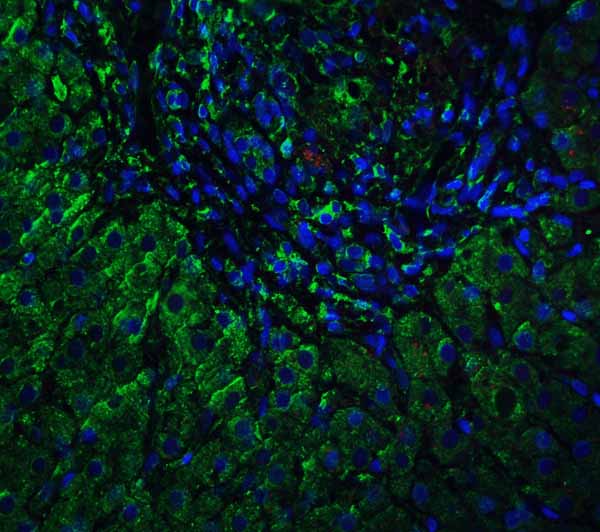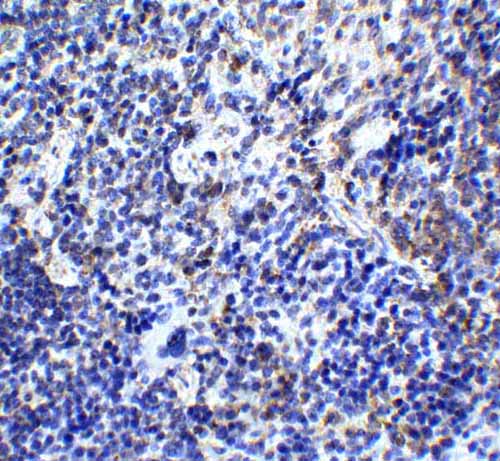DNase II Antibody
- SPECIFICATION
- CITATIONS
- PROTOCOLS
- BACKGROUND

Application
| WB, IHC-P, IF, E |
|---|---|
| Primary Accession | O00115 |
| Other Accession | AF047016, 1777 |
| Reactivity | Human |
| Host | Rabbit |
| Clonality | Polyclonal |
| Isotype | IgG |
| Calculated MW | Aprox: 40 kDa |
| Application Notes | DNase II antibody can be used for detection of DNase II expression by Western blot at 0.5 μg/mL. An approximate 40 kDa band can be detected, which represents the pro-enzyme of DNase II. Antibody can also be used for immunohistochemistry starting at 5 μg/mL. For immunofluorescence start at 5 μg/mL. |
| Gene ID | 1777 |
|---|---|
| Other Names | DNase II Antibody: DNL, DNL2, DNASE2A, Deoxyribonuclease-2-alpha, Acid DNase, DNase II alpha, deoxyribonuclease II, lysosomal |
| Target/Specificity | DNase II antibody was raised against a 14 amino acid peptide near the carboxy terminus of human DNase II. The immunogen is located within the last 50 amino acids of DNase II. |
| Reconstitution & Storage | DNase II antibody can be stored at 4℃ for three months and -20℃, stable for up to one year. As with all antibodies care should be taken to avoid repeated freeze thaw cycles. Antibodies should not be exposed to prolonged high temperatures. |
| Precautions | DNase II Antibody is for research use only and not for use in diagnostic or therapeutic procedures. |
| Name | DNASE2 |
|---|---|
| Synonyms | DNASE2A, DNL2 |
| Function | Hydrolyzes DNA under acidic conditions with a preference for double-stranded DNA. Plays a major role in the clearance of nucleic acids generated through apoptosis, hence preventing autoinflammation (PubMed:29259162, PubMed:31775019). Necessary for proper fetal development and for definitive erythropoiesis in fetal liver and bone marrow, where it degrades nuclear DNA expelled from erythroid precursor cells (PubMed:29259162). |
| Cellular Location | Lysosome. |
| Tissue Location | Expressed in monocytes/macrophages (at protein level). |

Thousands of laboratories across the world have published research that depended on the performance of antibodies from Abcepta to advance their research. Check out links to articles that cite our products in major peer-reviewed journals, organized by research category.
info@abcepta.com, and receive a free "I Love Antibodies" mug.
Provided below are standard protocols that you may find useful for product applications.
Background
DNase II Antibody: Apoptosis is characterized by several morphological nuclear changes including chromatin condensation and nuclear fragmentation. These changes are triggered by the activation of members of caspase family, caspase activated DNase, and several novel proteins including AIF and Acinus. DNase II causes both chromatin condensation and DNA fragmentation. The genes encoding human, porcine, and murine DNase II have been cloned. The DNase II gene encodes a 40 kDa proenzyme. The mature enzyme consists of two non-identical subunits, the 32 kDa (alpha) and 12 kDa (beta) chains, generated by proteolytic processing. Overexpression of DNase II induces chromatin condensation. DNase II is ubiquitously expressed in human tissues.
References
Zamzami N, Kroemer G. Condensed matter in cell death. Nature 1999;401:127-8
Yasuda T, Takeshita H, Iida R, Nakajima T, Hosomi O, Nakashima Y, Kishi K. Molecular cloning of the cDNA encoding human deoxyribonuclease II. J Biol Chem 1998;273:2610-6
Krieser RJ, Eastman A. The cloning and expression of human deoxyribonuclease II. A possible role in apoptosis. J Biol Chem 1998;273:30909-14
Shiokawa D, Tanuma S. Cloning of cDNAs encoding porcine and human DNase II. Biochem Biophys Res Commun 1998;247:864-9
If you have used an Abcepta product and would like to share how it has performed, please click on the "Submit Review" button and provide the requested information. Our staff will examine and post your review and contact you if needed.
If you have any additional inquiries please email technical services at tech@abcepta.com.













 Foundational characteristics of cancer include proliferation, angiogenesis, migration, evasion of apoptosis, and cellular immortality. Find key markers for these cellular processes and antibodies to detect them.
Foundational characteristics of cancer include proliferation, angiogenesis, migration, evasion of apoptosis, and cellular immortality. Find key markers for these cellular processes and antibodies to detect them. The SUMOplot™ Analysis Program predicts and scores sumoylation sites in your protein. SUMOylation is a post-translational modification involved in various cellular processes, such as nuclear-cytosolic transport, transcriptional regulation, apoptosis, protein stability, response to stress, and progression through the cell cycle.
The SUMOplot™ Analysis Program predicts and scores sumoylation sites in your protein. SUMOylation is a post-translational modification involved in various cellular processes, such as nuclear-cytosolic transport, transcriptional regulation, apoptosis, protein stability, response to stress, and progression through the cell cycle. The Autophagy Receptor Motif Plotter predicts and scores autophagy receptor binding sites in your protein. Identifying proteins connected to this pathway is critical to understanding the role of autophagy in physiological as well as pathological processes such as development, differentiation, neurodegenerative diseases, stress, infection, and cancer.
The Autophagy Receptor Motif Plotter predicts and scores autophagy receptor binding sites in your protein. Identifying proteins connected to this pathway is critical to understanding the role of autophagy in physiological as well as pathological processes such as development, differentiation, neurodegenerative diseases, stress, infection, and cancer.



